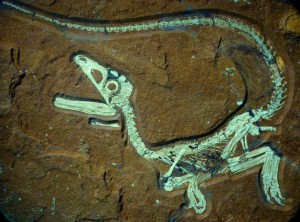 Paleontologists in Kelheim, Bavaria, have discovered the fossil of a young dinosaur that is 98% intact, including some remains of skin and hair. This makes young Otto, as the fellow has been dubbed, the most intact dinosaur skeleton ever found in Europe. The exact species has yet to be identified, but it belongs to the theropod suborder, a group of mainly flesh eaters whose most famous member is Tyrannosaurus Rex.
Paleontologists in Kelheim, Bavaria, have discovered the fossil of a young dinosaur that is 98% intact, including some remains of skin and hair. This makes young Otto, as the fellow has been dubbed, the most intact dinosaur skeleton ever found in Europe. The exact species has yet to be identified, but it belongs to the theropod suborder, a group of mainly flesh eaters whose most famous member is Tyrannosaurus Rex.
The fossil, named Otto by the paleontological team, is approximately 135 million years old. It was discovered between one and two years ago on a riverbank but the find was not announced until last Sunday to ensure the excavators would not be interfered with. The find site is still being kept secret, as is the name of the landowner who is now the proud papa of a bouncing baby theropod.
Oliver Rauhut, curator of the Bavarian State Collection for Palaeontology and Geology in Munich, says it’s “probably the most significant new theropod fossil archosaurs from German soil since the discoveries of the ancient bird Archaeopteryx.”
Though the 72-centimeter juvenile dinosaur is preserved in stone, a number of anatomical details remain. “The best-preserved Tyrannosaurus we have are about 80 percent preserved, and that is already terrific,” said Rauhut, comparing the two theropods, which are among the rarest dinosaur fossils.
Most of the fossils in this group exist in only fragments, said Dan Ravasz, spokesman for the upcoming mineral exhibition, The Munich Show, a trade fair dedicated to minerals, germs, jewellery and fossils that runs for four days starting on Oct. 27.
The experts aren’t certain just how old the dinosaur was when it died, though they estimate that a freshly hatched Tyrannosaurus would have been about the same size. They were able to determine that the specimen is young by measuring the size of its skull, body proportions and the bone surface. Learning more about young dinosaurs is important for scientists to understand more about their evolutionary process.
The German government has declared Otto a German cultural asset. That designation lowers its market value considerably by ensuring that it cannot leave the country. It will be on display for the full four days of The Munich Show, but after that its fate is uncertain. It appears that a permanent loan is being set up between the owner and the government so that Otto can go on display in a German museum.